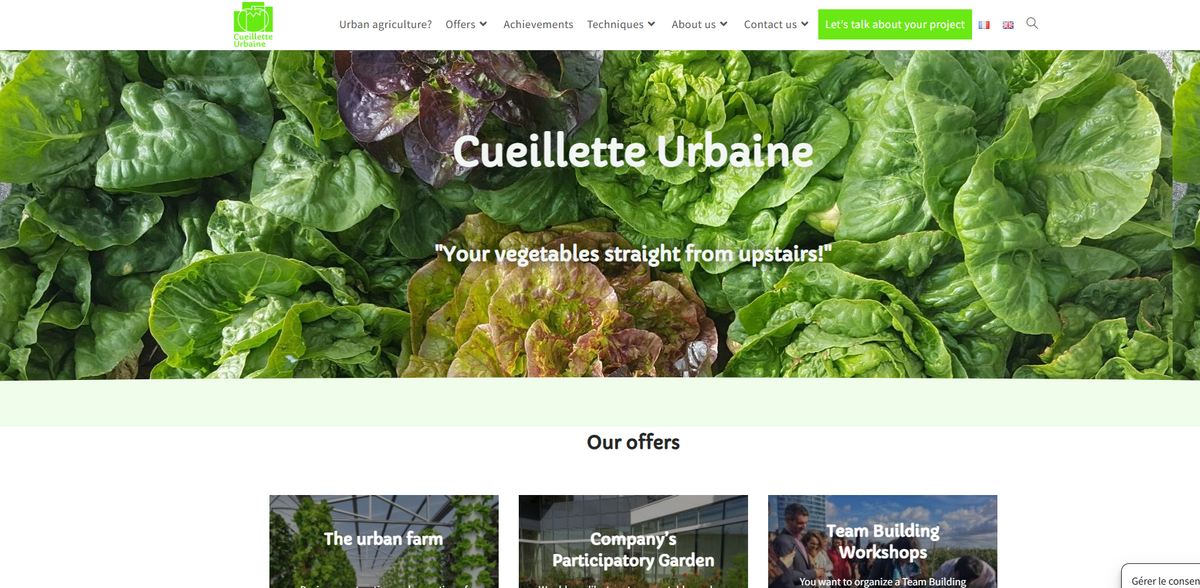What Is Cueillette Urbaine?
Cueillette Urbaine is a company working for the development of urban farming and its benefits for cities – “THE FRUITS AND VEGETABLES COME TO YOU, ON TOP OF YOUR ROOF!” This project is all about designing, installing, and operating vegetable production spaces on rooftops, terraces, and courtyards. The project offers an urban farm, a participatory garden within companies, team building workshops, and innovative urban agriculture solutions that embrace local, productive, and environmentally friendly models. It is a unique approach to reclaiming the city, especially as urban density encroaches on agricultural land… the vision is to cultivate new areas without intruding on natural spaces.
Main Benefits of the Urban Farm Approach
Key figures and facts illustrate how urban agriculture offers concrete benefits. Consider these points:
- Urban farms produce healthy, nutritious, and flavorful food locally.
- Soilless culture methods increase plant yield by 20–25%, with productivity 2 to 5 times higher, according to certain experts (FAO, 2014).
- Aeroponics, aquaponics, and permaculture techniques drastically reduce water consumption – up to 90% less than conventional methods (FAO, 2014).
- Energy consumption is kept to a minimum in turnkey systems that use technological advancements such as bioclimatic greenhouses for year-round cultivation.
- A circular economy is maintained by using only organic fertilizers for aeroponics, combined with fish fed on micro-algae breeding, ensuring sustainability.
Innovating with Cultural Techniques
The project employs an array of cultural techniques that are as innovative as they are ecological. The FOREST BED method creates a self-sufficient cultivation bed that allows optimal plant development while drawing inspiration from nature… Meanwhile, aquaponics sets up a symbiosis between aquaculture and agriculture for 100% natural high-yield production. Tower Garden, a method derived from hydroponics but taken vertically as aeroponics, and the bioclimatic greenhouse installation both contribute to a better spread of production throughout the year, minimizing climatic hazards. Such techniques not only ensure sustainability but also empower cities to become greener and more resilient.
Sustainable & Ecological Operation
Urban agriculture, as embraced by Cueillette Urbaine, is the answer to many contemporary challenges. As cities grow denser and encroach on fertile lands, the need to cultivate in new ways has never been more pressing. The premise is simple yet revolutionary: produce some fruits and vegetables locally without associated pollution, thereby promoting safe and eco-friendly consumption. This approach makes use of cutting-edge ecological technics to cultivate tasty herbs, vegetables, and even fish, using aeroponics, aquaponics, and permaculture technics that ensure minimal energy consumption. It is a system where nature and technology blend seamlessly, offering a productive solution that respects the environment.
Engaging Community Initiatives
Beyond technology and production, the project places great emphasis on community engagement. Participatory gardens are developed within companies, fostering team cohesion and creating opportunities for social bonds to flourish. Alongside gardening, team building workshops—ranging from seasonal cooking sessions to exploring natural cosmetics—invite participants to step into a world where ecology meets social reintegration. These initiatives are not only about cultivating plants; they are about cultivating community spirit, helping people form meaningful connections through shared, hands-on experiences in the garden.
Impact on Urban Development
- SDG 2: Zero Hunger – by producing healthy, locally grown food.
- SDG 11: Sustainable Cities and Communities – through innovative urban farming solutions.
- SDG 12: Responsible Consumption and Production – by promoting ecological technics and circular economy values.
- SDG 13: Climate Action – with reduced water and energy usage and a focus on environmental sustainability.
- SDG 15: Life on Land – by reintroducing agriculture in urban contexts in a way that respects natural areas.
Exploring Future Perspectives in Urban Agriculture
The ongoing efforts of Cueillette Urbaine paint an optimistic picture for the future of urban agriculture. The project continuously explores sustainable practices not only to produce vegetables and herbs but also to reinforce the concept that urban spaces can be transformed into hubs of greenery and productivity. After two years of research and development, a substrate made only with biowaste has been created – a prime example of the project’s commitment to innovation. The white paper on creating a garden in the company offers insights into setting up such spaces, answering common questions with practical advice. In essence, urban agriculture is not merely a trend; it is a shift towards a more sustainable and interconnected way of living that blurs the lines between technology, nature, and community… paving the way for cities that are both productive and environmentally friendly.


















